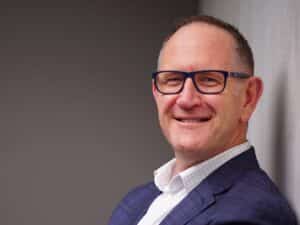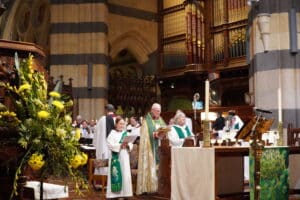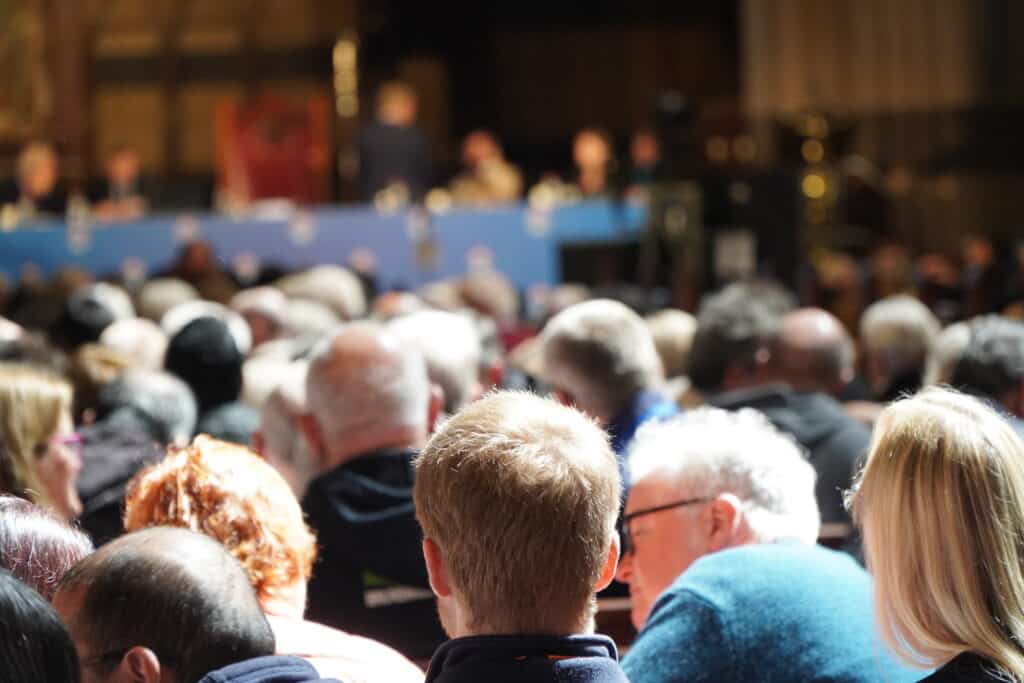
3.30pm
That’s it for the 2024 Melbourne Synod.
Some of the motions and items we heard today were:
- Reconciliation
- The Minimum Age for Parish & Synod Membership
- Diocesan Sustainability Strategy Working Group
- Board of Nominators presentation
- Thanks for the ministry of the Most Reverend Dr Philip Freier as Archbishop of Melbourne.
Earlier this week, we also heard about the following among a range of matters:
- Healthy Chaplaincy
- Disability Inclusion and Accessibility
- Apology to Girls’ Friendly Society
- People Seeking Asylum
- Anglican Overseas Aid
- Hope25
Thank you very much for sticking with me and Hannah Felsbourg this week. We hope you enjoyed synod if you were able to get to it in person, and if not, that you enjoyed our coverage.
We’ll bring you further reporting on Monday to follow-up on some items.
Good night, Jenan.
3.05pm
Bishop Paul Barker has presented the synod Honours list. Clergy on this list were the Reverends:
Fiona Goy, Peter MacPherson, Kevin Pederson, Jonathan Taylor, Sophie Watkins and Dr Alan Smith.
Bishop Kate Prowd also moved a motion in recognition of members who had died since the last synod.
These were the Reverends Frederick Cook, Norman Gray, Thomas Morgan, John Stewart, Elizabeth Bufton, Frederick Wandmaker, Peter Harradence, Suzan Brooks and the Bishop Gerald Beaumont, and Dr Alan Gregory AM, Mrs Wendy Simpson, Mr Malcolm Durant and Ms Audrey Williams.
Bishop Bradly Billings has moved a motion of thanks to all who participated in organisation of the synod including the archbishop, chancellor and depty chancellor, musicians, and technical staff,
Malcolm Tadgell also thanked all who had prepared the synod reports, and legislation, as well as the presenters, movers and seconders, those who prepared answers to questions, leaders of worship and music and the cathedral team, various committees and working groups, and Ms Pauline Caruana.
In closing Archbishop Freier reflected the previous synods he’d chaired in various dioceses and said Melbourne was the highlight. He said it was a pleasure seeing out the journey as archbishop with this synod.
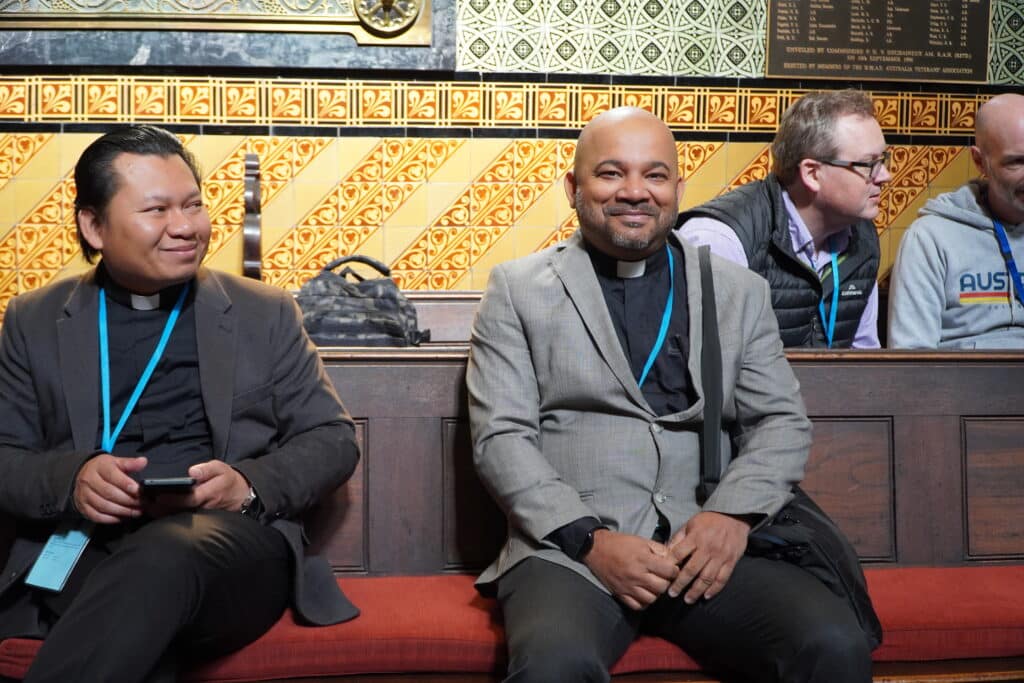
2.40pm
Dr Jenny George has given a presentation on the Board of Nominators about the upcoming archbishop election.
Over 400 nominations have been received for the upcoming archbishop election, with 15 people having at least 10 nominations.
Dr George said the goal of the board was to empower voters to be able to make a decision on who the next archbishop should be.
A survey has been sent out to parishes, with respondents from a range of different language groups.
Read more: The archbishop is retiring. What happens next? Explainer
Respondents were concerned with declining, aging churches, reduced next generation engagement, issues of viability and sustainability, multicultural growth, and church plants.
Among respondent’s priorities for the next archbishop were:
- A spirituality sustained by a deep dependence on upon prayer and the diligent study of scripture
- Seek’s to imitate Christ’s character and servant heart
- Thinks strategically about future direction and growth
Some of the key strengths desired by respondents were in the areas of church revitalisation, evangelism, and advocacy and engagement in public spaces.
The selection criteria for candidates have been developed through prayer, discussion, consultation, feedback in survey responses, and reflection on scriptures.
Selection criteria include episcopal, leadership, contextual and personal considerations.
Read more: What does Melbourne need in a new archbishop? Board calls for your thoughts
The expected timing of the election synod is May 2025. In the meantime, Dr George encouraged church members to pray over the election process.
She urged them to consider a range of things in reflecting on a who a new leader could be, including sustainability challenges and strategic future.
She said if there was leader people thought would be right for the diocese, please nominate them, and please participate in consultation.
Nominations are open until the end of October. More information can be found at https://www.boardofnominators.org/.
2.12pm
The AiC in conjunction with the registry will develop a policy for managing extended access to data on the ADoM portal.
They will also promulgate a mechanism for members of the diocese to request access to documents “made available on the Diocesan website” under 34A.
This motion was introduced in response to the Archbishop in Council Amendment Bill 2024. The Reverend Chris Porter moved the motion, and Muriel Porter seconded it.
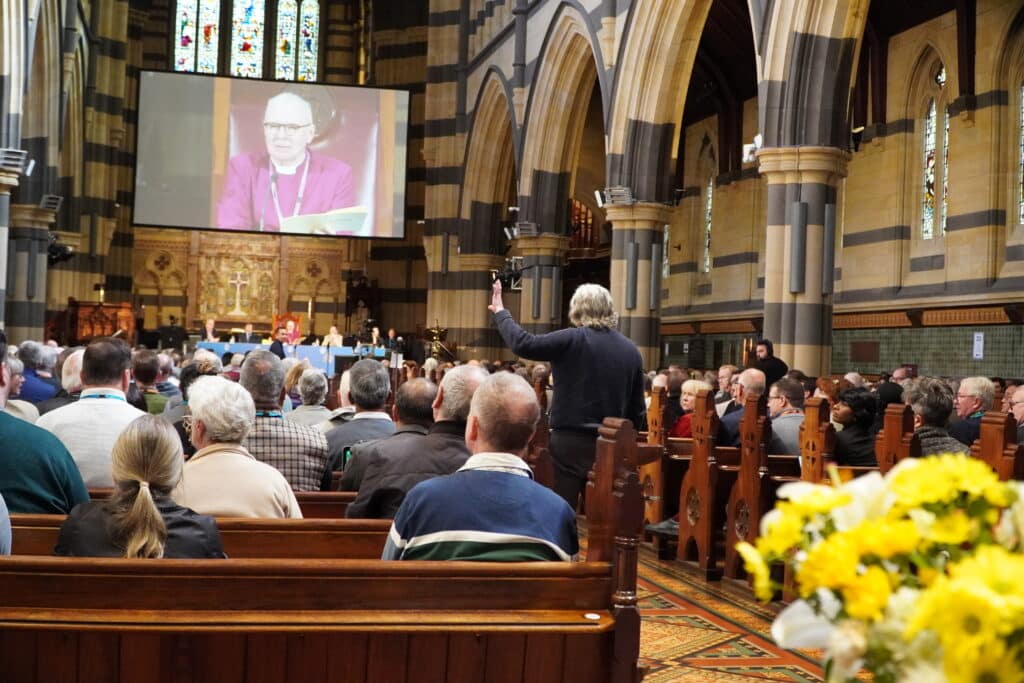
2.03pm
Synod has cleared the way for a review of current legislation, seeking to allow confirmed church members under 18 to serve on parish councils and participate in Synod.
Synod has tasked the Children’s and Youth Ministry Steering Committee with identifying the specific legislative changes necessary to enact this.
The committee is expected to report its findings to the Archbishop in Council and bring a bill to the next session of Synod for approval.
This move acknowledges the contributions of younger members and aims to formalise their eligibility for greater participation in church governance.
The Reverend Graham Stanton said the motion aimed to make confirmation, not age, the basis for parish and Synod membership.
Read more:
“Confirmation is how we recognise a person as a full member of our church. Confirmed members are called to take their part in the life of the church,” he said.
“This motion is suggesting that ‘the life of the church’ should include our processes of decision-making.”
Dr Stanton said involving young people in church governance would foster their engagement in church by giving them a sense of agency.
“Giving young people a voice in the Church will give them a stake in the Church,” he said.
Jenny George reflected on her own experiences as a 14-year-old being able to vote on
“What are we worried about? Gangs of 16 years olds so serious about God they want to run the church? God give us that problem,” she said.
Concerns were raised around allowing those under 18 to sit on parish council or at synod as they do not have the same level of legal responsibility as adults.
Dr Stanton said this would be taken into consideration and while some roles would be legally restricted to over-18s, the goal was to prevent under-18s from being excluded from decision-making entirely.
The Reverend Graham Stanton moved the motion, and Bishop Genieve Blackwell seconded it.
It aligns with the committee’s aim to create tailored models to engage young people in ministry and governance roles and reinforces Synod’s commitment to youth inclusion.
1.27pm
Synod reaffirmed its commitment to reconciliation with First Nations people, passing a motion that supports ongoing efforts towards truth-telling, treaty, and justice.
The synod acknowledged the courage and resilience of First Peoples in the Anglican Diocese of Melbourne and the broader Province of Victoria.
It affirmed the Church’s 2017 commitment to the reconciliation process outlined in the Statement from the Heart, which includes Voice and Treaty.
The resolution celebrated recent progress, including a formal response to the Aboriginal Council of the Anglican Province of Victoria.
Notable achievements included a Provincial submission to the Yoorrook Justice Commission and the appointment of the Venerable Uncle Glenn Loughrey as Provincial Archdeacon for Reconciliation and Treaty.
Synod also adopted a strategy to allocate 15% of proceeds from future church property sales for Aboriginal reparation and ministry.
Church leaders, parishes, and schools were urged to engage in truth-telling, repentance, and justice alongside First Peoples.
Synod encouraged further collaboration with First Peoples to support self-determination and treaty-making, aiming for a more just relationship.
Mover of the motion the Very Reverend Dr Andreas Loewe said the faithfulness of Anglican Aboriginal lay people and clergy to the good news of Jesus Christ was a gift despite the suffering of their communities.
Motion seconder Ngarrindjeri woman the Reverend Canon Helen Dwyer said the church had not always been a safe place for Aboriginal people.
She said the motion was a chance for Aboriginals to say in a unified voice that there was room here for them.
“Christ loves the church, and I love Jesus, so I want the church to be a safe place for us,” Canon Dwyer said.
12.15pm
Synod is taking a break, and we’ll return at 1pm.
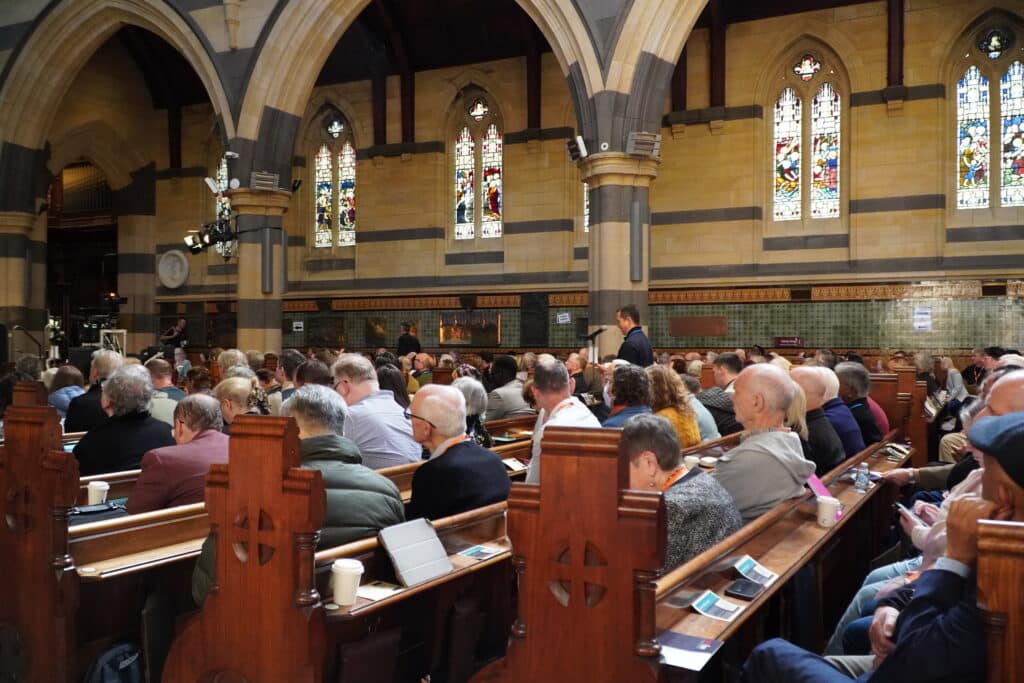
11.55am
The Reverend Dr David Powys has spoken against the Revised 2025 Diocesan Budget and Revised 2026-2027 Financial Forecast motion. He said there was not enough transparency and accountability in the diocese’s property land sales.
He said more consistency and coherence was needed in the way the diocese went about its affairs.
The Reverend Dr Andrew Judd also spoke against this motion. He said in the past he had put a motion to synod asking to have expenditure brought inline with income but this had not happened.
“We are in a cash burn situation. And this is costing us more than redress,” Dr Judd said.
He said there was no focus on reducing our expenditure, and the cost side of the equation had to be looked at too, not just the income side.
He said the budget needed to be sent back to AiC to look at again, and the church needed to try to live within its means.
Ms Brown responded, saying this was not a new situation as Dr Powys and Dr Judd indicated, but that this was different in that the quantum was different to the past.
In 2019, $12 million was contributed to redress and it was important to honour those responsibilities, but they were significant, Ms Brown said.
She said the diocese needed to consider the requirements to manage its expenses wisely but more importantly need to look at the structure.
Fixing expenditure would not solve the problem because it was a structural problem.
“In fixing it that was how we could live within our means,” Ms Brown said.
Synod accepted the revised budget.
Delegates also accepted motion 2, that the Diocesan Accounts for the year ended 31 December 2023 be received.
The Registrar Malcolm Tadgell moved the motion, the Reverend Kirsty Brown seconded it.
11.45am
Chair of Finance for the Diocese the Reverend Kirsty Brown has presented the Revised 2025 Diocesan Budget and Revised 2026-2027 Financial Forecast, with a call for both fiscal responsibility and continued focus on mission.
Ms Brown highlighted the importance of aligning financial decisions with the Church’s spiritual goals.
“It is our vision, mission, and values for the sake of the gospel that determine what we do, how and when—it is the gospel that determines our priorities,” she said.
The budget, which was consolidated to cover five entities including the Anglican Diocese of Melbourne and the Anglican Development Fund, provides a clear picture of the Church’s income and expenditure for the coming years.
Ms Brown said income in 2025 was expected to come almost equally from property sales, investment income, parish assessments, and other sources.
Turning to expenditure, she pointed out several major outgoings for the year ahead.
“Our expected cash outflow in 2025 reflects the major outgoings of Diocesan services staffing costs, redress, the GFS settlement, and church planting,” she said.
Although the budget shows a surplus after accounting for extraordinary items, Ms Brown warned of a projected cash deficit.
“Once adjusted for items related to the balance sheet, the net reduction in cash for the year is expected to be $13 million,” she said.
Ms Brown also discussed the assumptions behind the budget, noting that the diocese had chosen to base its budget on realised investment income rather than the more volatile unrealized gains or losses.
She stressed the importance of financial stability in ensuring the diocese could continue its work.
“Deficit budgets are not good and are not sustainable,” she said.
“Saving $100,000 here or there is just tinkering at the margins of our budget—we need structural change and we need to start working on it now.”
In light of these challenges, Ms Brown urged the Synod to continue engaging with the Diocesan Strategy and Sustainability Working Group to secure a sustainable future.
“We need the riches we hold to be in a form that can be utilized well for ministry in the 21st century,” she said.
She concluded by reminding synod members that their financial decisions carried spiritual weight.
“The decisions we make are not just fiscal—they are spiritual. They reflect our commitment to the Gospel, our trust in God’s abundance, and our shared mission to proclaim the Good News,” she said.
The presentation highlighted the need for both structural financial reforms and a shared commitment to ensuring the Church’s resources are directed toward its mission of spreading the gospel.
Reverend Brown moved the motion, and it was seconded by Malcolm Tadgell.
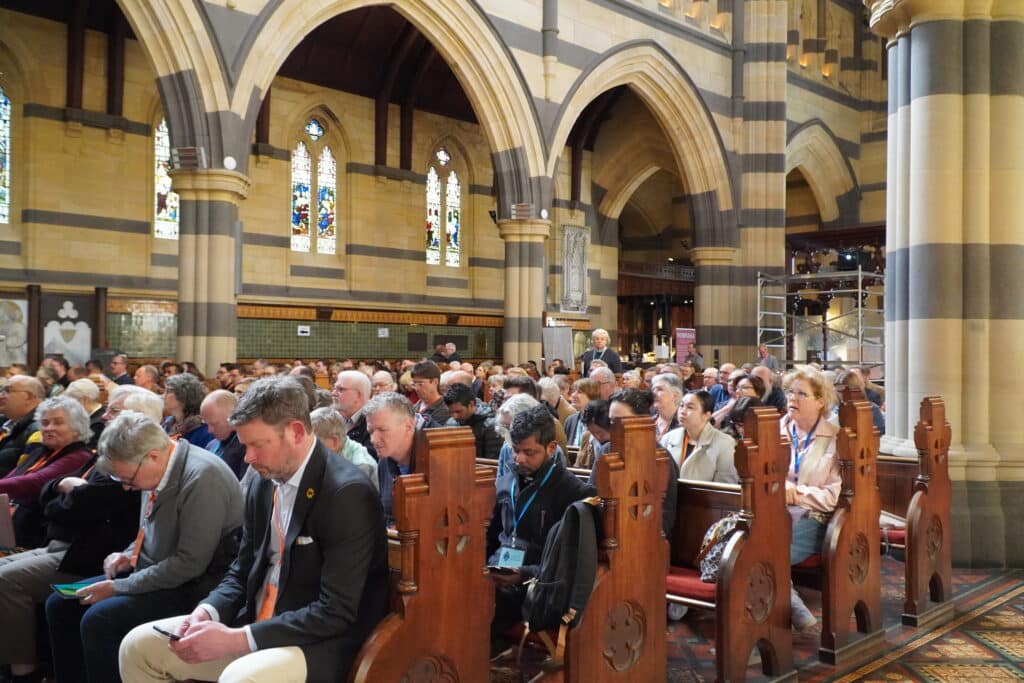
11.15am
Following Bishop Barker’s presentation, synod representatives gathered in small groups to discuss the questions in Book B of synod business papers. These aimed to start deep consideration of the task of approaching sustainability into the future.
The questions were:
- What made a parish viable,
- What is God calling us to do and how would we know this
- What would have to be given up in order to grow
Bishop Barker said the working group anticipated releasing a summary of the feedback received today in December.
11.10am
The Right Reverend Dr Paul Barker has spoken about the Diocesan Sustainability Strategy Working Group.
Bishop Barker said the stresses to sustain the church’s ministry were increasing. He said the motion about the diocesan budget and finance was not one for debate but rather one that needed careful consideration and consultation. He said manoeuvring the diocese into long term missional sustainability would be a major task in the next two years.
He said it was a dilemma that the diocese needed advice on because it was about much more than just balancing the books.
“We want to have great expectations to be best placed for ministry and mission for the next generations. If we are to be strategic and sustainable for the long-term, we need to address these issues urgently,” Bishop Barker said.
10.40am
Synod has expressed thanks for the ministry of the Reverend Dr Philip Freier as Archbishop of Melbourne.
It asked Synod, on behalf of the Anglican Diocese of Melbourne to:
- Give grateful thanks for Archbishop Philip’s:
- 18 years of leadership and ministry to the people of the Diocese, our Anglican agencies, schools and the wider community, including as an advocate for social justice for First Nations people, women, and newcomers to Australia
- Wisdom, composure, grace and humour as the President of the Synod,
- Leadership at all levels of the Anglican Church, including as the Metropolitan of the Province of Victoria, as a Metropolitan and the Primate within the Australian Church and the Anglican Communion, and in advancing Christian unity, including as co-Chair of the Anglican-Roman Catholic International Commission
- Express its gratitude to Mrs Joy Freier OAM for her generous contribution to the ministry and life of the Diocese and for her service to the Anglican Church of Australia, and
- Pray for God’s blessing on Archbishop Philip and Mrs Freier as he prepares to lay down his pastoral staff and they move towards the next stage of their lives.
In her mover’s speech Bishop Blackwell spoke of how the archbishop through his leadership had managed to encourage diversity and inclusion as well as meaningful engagement with First Nations Australians.
“Diversity and inclusion doesn’t just happen but requires intentionality which you have exemplified,” she said.
She also spoke of how he had worked with faith leaders globally, nationally, across the province and here in Melbourne.
Mr Colin Reilly seconded the motion and during his speech reflected on some of the long history of archbishops.
Mr Reilly said by the time Archbishop Freier came to the Melbourne diocese Melbourne and Geelong had become the most culturally and ethnically diverse urban areas in Australia with a lower proportion of Anglicans than any other part of the country.
He said in this challenging era of increasing secularisation in society, leadership of its most ecclesiologically diverse diocese was not for the faint hearted.
“In the words of the ordinal it is the duty of the bishop ‘to watch over, protect and serve the people of God, to teach and govern them, and to be hospitable’,” Mr Reilly said.
He’d observed that the archbishop had done all this and more in a non-partisan way in what have been difficult times, as the archbishop mentioned in his Charge.
Mr Reilly outlined a few indicators of how our ecclesial life fared during Archbishop Freier’s episcopate.
These included that:
- The archbishop ordained more clergy than any of his predecessors – and those ordained have been more diverse – by gender, ethnicity, and ecclesial identity – than ever before. According to his records since coming to Melbourne the archbishop had been the chief consecrator for eight bishops, and ordained 273 deacons and 311 priests.
- Clergy numbers were maintained and Melbourne had the lowest parish vacancy rate of any metropolitical diocese. There were more diverse forms of local ministry with Authorised Anglican Congregations and, more recently, ministry presences.
- Although Melbourne diocese faced perhaps the most challenging demographic situation of all Australian dioceses, the pattern of worship attendance during the Freier episcopacy had had the same trajectory as the most populous and richest diocese in the country – Sydney.
- The number of Anglican school campuses had grown and there were now more young people attending them than ever.
Mr Reilly said he witnessed the Archbishop’s ministry of oversight as a member of this Synod, of the Archbishop in Council, the Cathedral Chapter, Provincial Council, General Synod and, more recently, the Melbourne Anglican Trust Corporation and the Bishopscourt Management Committee.
In all these forums he had been well prepared and had chaired them with impartiality and equanimity.
Mr Reilly said Archbishop Freier had brought clarity and temperance when debate had become fractious.
He also spoke of Mrs Joy Freier saying she exemplified the virtue of joy whilst supporting the archbishop’s ministry and exercising her own ministry of ‘service to the Anglican Church of Australia, and to education’, recognised by the awarding of an OAM in 2022.
He added a personal footnote sharing the memory of when his parents both died in the early years of his Melbourne episcopate, Philip and Joy invited him to Bishopscourt for lunch on the following Christmas Day.
“I shall be forever grateful for the pastoral care and hospitality extended to me at that time,” he said.
“I dare say there are many here who have experienced similar unsung expressions of Archbishop Philip fulfilling his ministry with grace and care as our bishop.”
“Mr Acting President, I commend the motion to Synod.”
Bishop Billings concluded with a prayer of thanks and blessing for Archbishop Philip Freier and his wife Joy.
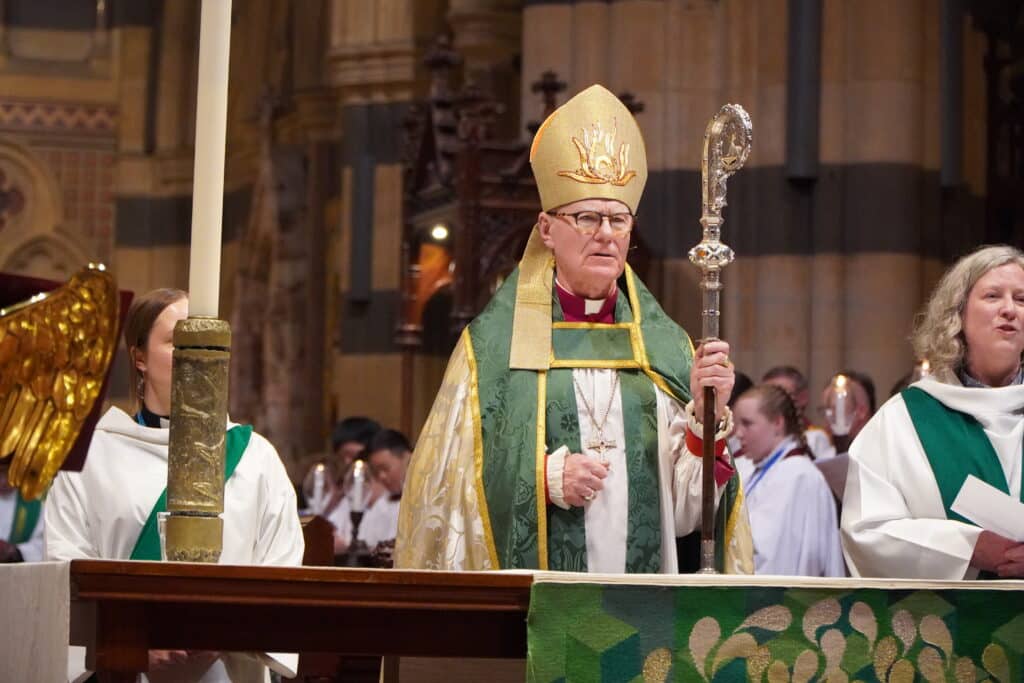
10.21am
Earlier we enjoyed brief morning worship session which included the hymns Ye Servants of God and a reading from Mathew 12.38-50.
Malcolm Tadgell issued an apology for the technical difficulties experienced in Thursday night’s session acknowledging they were caused by ADoM’s new firewall systems.
The Reverend Chris Porter presented motion 23, to be seconded by Dr Muriel Porter, which comes in response to the Archbishop in Council Amendment Bill 2024.
Leave was given for the motion to be included in the business papers. Things are moving along quite fast, so we’ll bring you more on this later.
There was some discussion about motion 15, Code of Conduct for Child Safety and Wellbeing, during which Mrs Fiona McLean raised a question about the motion.
She said it wasn’t clear under what standing orders the motion was withdrawn.
She requested that the mover’s speech be allowed to heard so that there could be understanding of the motion.
She was advised the matter had already been struck off the agenda so there was no opportunity to hear this speech.
9.30am
Hello from me, Hannah Felsbourg, reporting from St Paul’s Cathedral on a fresh Melbourne morning!
It’s hard to believe we’ve already arrived at the final Saturday session of Melbourne Synod.
My colleague Jenan Taylor and I will be taking you through all of today’s happenings including:
- A Reconciliation speech by the Reverend Andreas Lowe
- The Minimum Age for Parish and Synod Membership
- 2025 Diocesan budget motions
- Discussion on the Diocesan Sustainability Strategy
- Thanks for Archbishop Phillip Freier’s ministry
Minimum Age for Parish & Synod Membership
This motion aims to allow confirmed church members under 18 to serve on parish councils and participate in Synod.
Read more: Hopes high for flourishing children’s and youth ministry after new committee established
If passed, it will direct a committee to identify the necessary legislative changes and bring a bill to the next session of Synod.
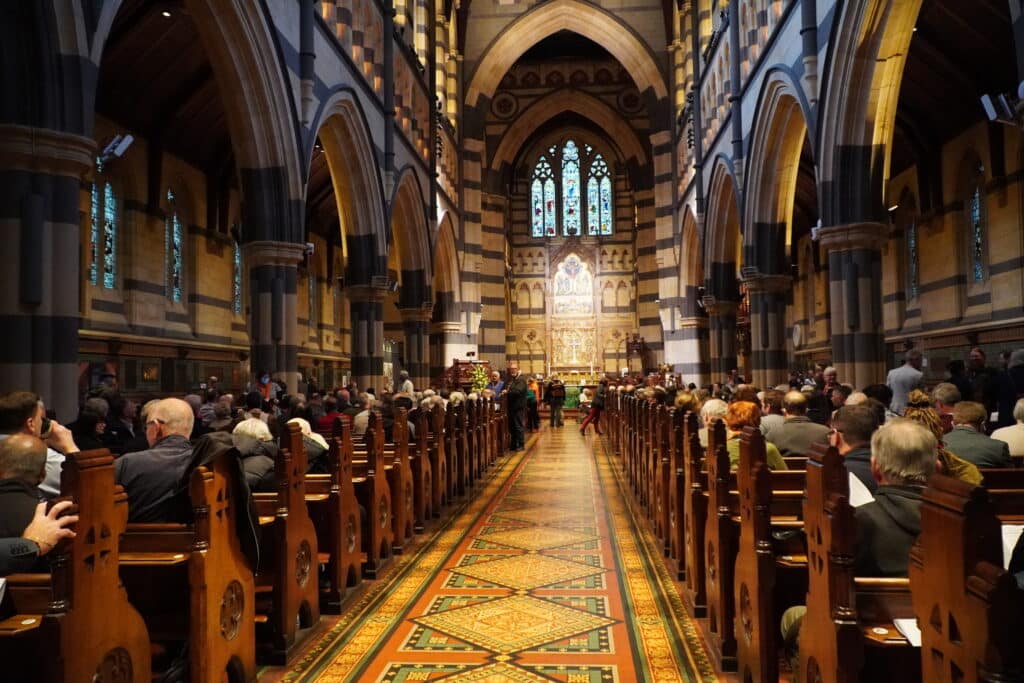
Finance
There will be presentations on the diocesan budget and financial forecast, and speeches about the diocesan accounts.
Read more: 2024 Presidential Address to the Melbourne Synod
Some highlight from Synod in the past days have been:
- Archbishop Philip Freier delivered his final president’s address, emphasising reconciliation, truth-telling, and the challenges of his 17-year tenure.
- The healthcare chaplaincy motion passed, ensuring ongoing support and funding for chaplaincy in hospitals and aged care facilities.
- A motion supporting asylum seekers was passed, calling for improved visa processes, access to essential services, and fair review systems.
- Disability inclusion will be prioritised, with a comprehensive action plan set for 2025, and parishes encouraged to improve accessibility.
- The Hope25 evangelism initiative was embraced, encouraging parishes to engage in outreach beyond their communities.
Revisit our coverage of the 2024 Melbourne synod sessions here:
Always, don’t hesitate to reach out to editor@melbourneanglican.org.au with any queries, comments or corrections.
Enjoy the session!


